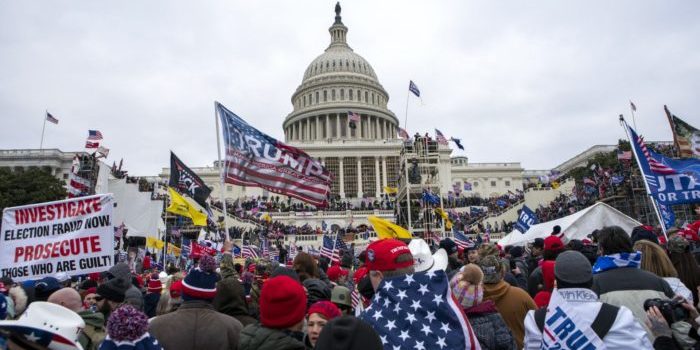(Ken Silva, Headline USA) Though Donald Trump is expected to issue pardons to numerous Jan. 6, 2021, Capitol Hill protestors, Politico reported Monday that the Justice Department could charge some 200 more of them before President Donald Trump is inaugurated on Jan. 20.
“Federal prosecutors are weighing charging as many as 200 more people for their involvement in the Jan. 6 attack on the Capitol — including 60 suspected of assaulting or impeding police officers,” Politico reported, citing a Monday announcement from the DOJ.
According to Politico, some 1,583 people have faced federal charges stemming from Jan. 6—up more than 100 cases from the 1,457 arrests as of June.
“Though about 1,100 defendants have been convicted and reached sentencing — including 700 who have completed jail sentences or received no incarceration at all — another 300 charged cases have not yet reached trial or a guilty plea, including about 180 facing felony charges,” Politico added.
DOJ stats show that the federal government’s furious pace of arrests continued throughout this year. The DOJ charged 725 from January 2021 to January 2022; more than 200 in 2022; about 225 last year; and another 419 through nearly the first half of 2024.
Meanwhile, U.S. Attorney for the District of Columbia Matthew Graves, who spearheaded the prosecution of hundreds of peaceful Jan. 6 protestors over the last three-plus years, is resigning effective Jan. 16.
According to the “Sedition Hunters,” about 3,900 people committed crimes at the Capitol on Jan. 6. That includes people who breached the Capitol and those who engaged in violence on the grounds, but not the people who were on the Capitol grounds—itself a crime—but otherwise didn’t violate any laws.
“About 626 people have been charged with assaulting law enforcement and media, or entering a restricted area with a dangerous or deadly weapon,” Raw Story reported in April.
“Based on those numbers, the arrest rate for violent offenders would need to pick up the pace from about 16 per month to 26 per month in order to meet the deadline before the statute of limitations runs out on Jan. 6, 2026.”
Ken Silva is a staff writer at Headline USA. Follow him at x.com/jd_cashless.

